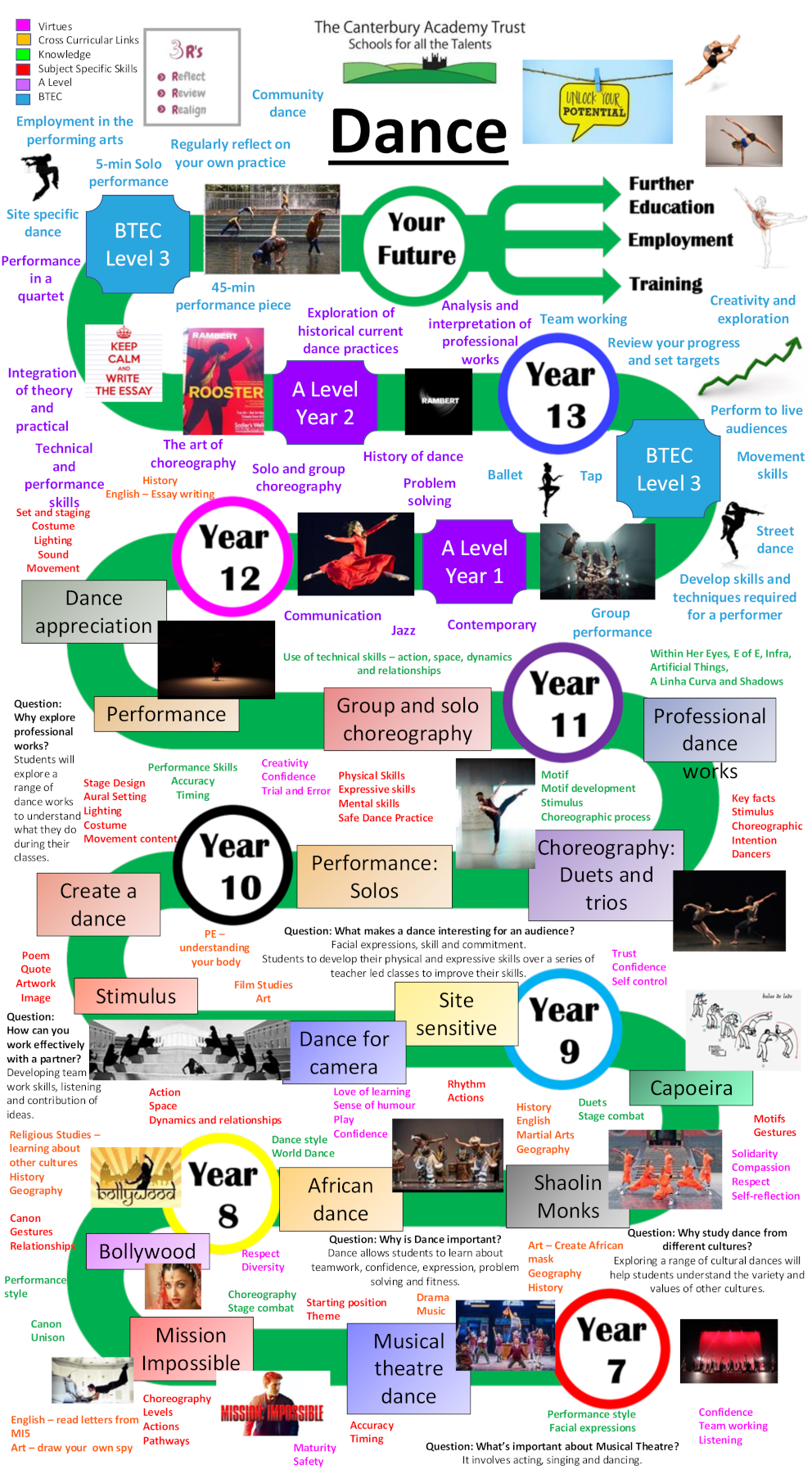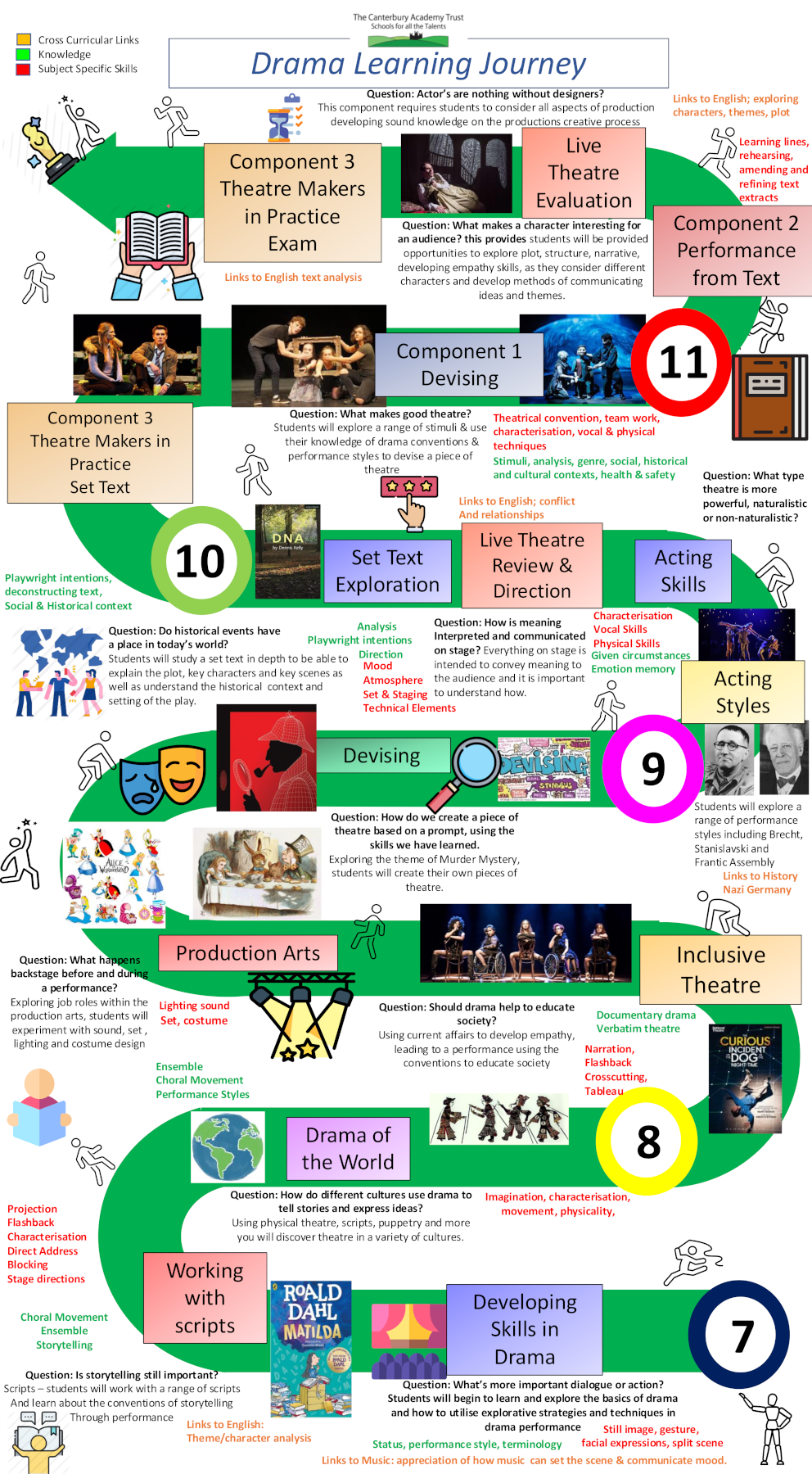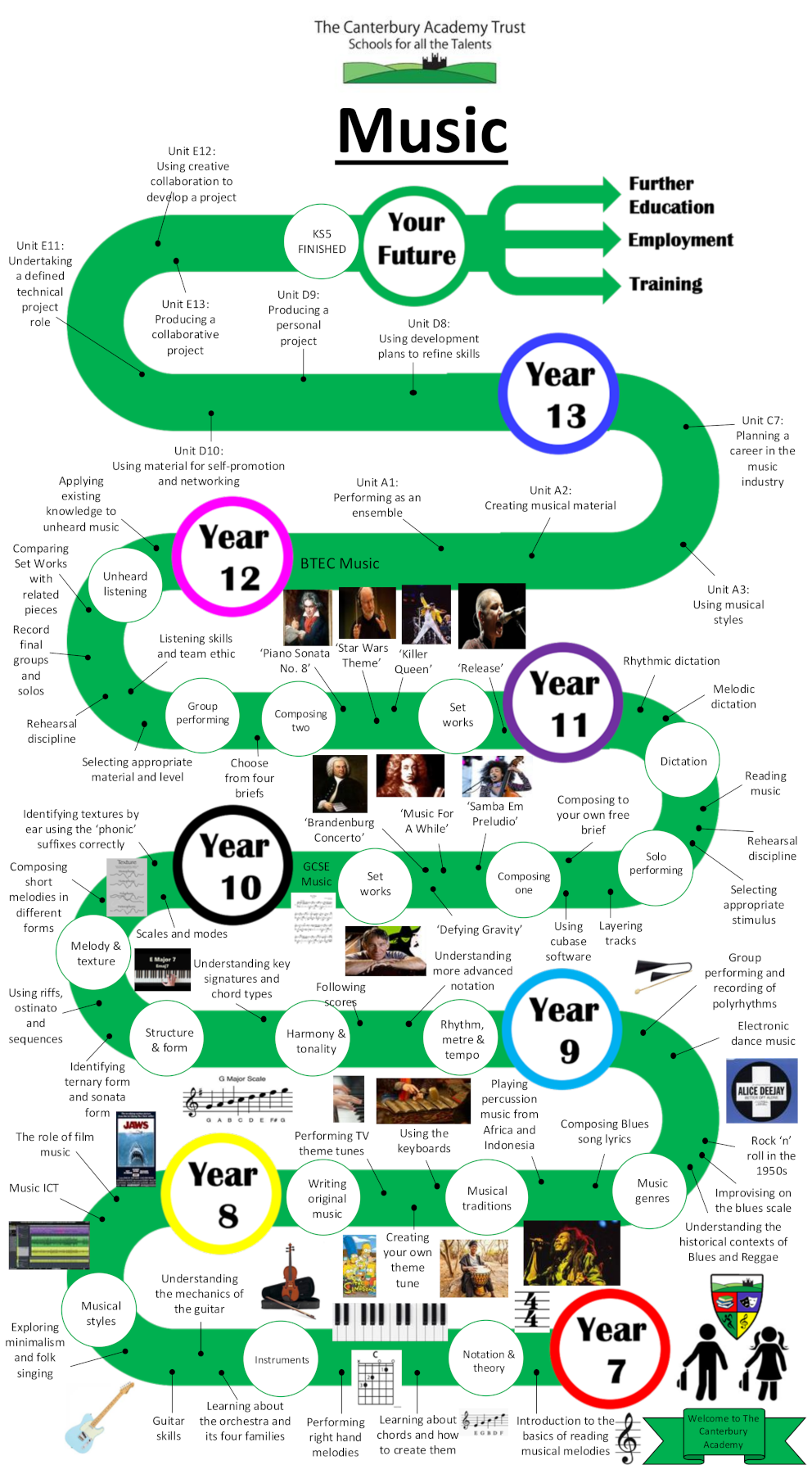Why Study Dance?
Studying Dance can help build creativity, teamwork and problem-solving skills. It can also improve physical fitness and mental health. Dance will open your eyes to the influence that dance has had throughout history in different cultures as well as allowing you to tell current stories and share messages of your own. It can be an outlet for emotion and expression.
The purpose of studying Dance at The Canterbury Academy is…
- To help build physical, mental, and social skills
- To express emotions
- To build confidence and creativity
- To improve fitness
- To explore different cultures
- To appreciate performance
- To learn a range of styles
See our learning journey
In Year 7 and 8 Dance at The Canterbury Academy the students have one lesson a fortnight in which they explore a new project each term, such as Mission Impossible, Bollywood, Street Dance, Musical Theatre, and Stomp. Students will build upon their dance skills and knowledge in each lesson as they learn about the topic through practical work. There are opportunities for the students to perform at the end of the project and show an audience what they have been learning about. Students will answer questions in class to show their understanding and will perform informally in groups to show their progress.
In Year 9 students will select if they want to continue studying Dance and their learning journey will become much focused. They will develop their choreography skills, performance qualities, appreciation of live performance and will learn a range of dance styles. There are many opportunities to perform and watch live dance.
In Year 10 and 11 students can study GCSE Dance in which they will take part in choreographing and performing as solos, duets and groups as well as develop their appreciation of dance even further by watching and exploring professional performances.
In Sixth Form we offer BTEC Level 3 Dance and A Level Dance, where students can extend their dance abilities and knowledge even further to prepare them for further education and beyond.
Why Study Drama?
The purpose of studying Drama at The Canterbury Academy is…
- Students will develop performance skills, including voice projection, movement, and stage presence, allowing them to confidently bring characters to life in front of an audience.
- Students will enhance their creative thinking abilities by devising original performances, interpreting scripts, and experimenting with different theatrical styles and techniques.
- Students will improve their collaboration and communication skills as they work closely with others, share ideas, and refine performances through teamwork and constructive feedback.
- Students will strengthen their analytical and evaluative skills by studying and critiquing live theatre, scripts, and their own performances to deepen their understanding of dramatic techniques.
- Students will gain technical and theatrical knowledge by exploring the use of lighting, sound, costume, and set design to create engaging and visually effective productions.
- Students will develop written and reflective skills by documenting their creative process, analysing performances, and producing detailed evaluations, which are essential for coursework and exams.
See our learning journey
Throughout their drama education from Years 7-11, students develop a range of performance, devising, and analytical skills, progressing each year in both confidence and creativity. The curriculum builds on prior knowledge, ensuring students refine their abilities and deepen their understanding of theatre as an expressive and analytical art form.
In Year 7, students are introduced to key drama techniques, learning fundamental skills such as voice projection, movement, and characterisation. They apply these skills through engaging themes, including Matilda the Musical, which helps them explore storytelling and stage presence. Later in the year, they broaden their understanding of drama as a global art form by studying theatre traditions from different cultures, developing an appreciation for diverse performance styles.
In Year 8, students build on their foundation by exploring drama as a tool for inclusivity, focusing on The Curious Incident of the Dog in the Night-Time, which introduces them to physical theatre and perspectives on neurodiversity. They further develop their devising and design skills through Alice in Wonderland, encouraging creativity in performance and staging. The year concludes with a Murder Mystery unit, where they refine their improvisation and narrative-building abilities, preparing them for more sophisticated devising work in later years.
By Year 9, students engage with more complex dramatic techniques and theatre practitioners such as Frantic Assembly and Stanislavski, gaining insight into different acting styles and methodologies. They study DNA by Dennis Kelly, developing their ability to analyse scripts and bring characters to life through deeper emotional and physical engagement. Additionally, they refine their devising skills and learn how to critically evaluate live theatre, enhancing their ability to articulate their thoughts on performance, design, and direction. These skills lay the groundwork for the analytical and creative demands of GCSE Drama.
In Year 10, students formally begin the Edexcel GCSE Drama course, applying their accumulated knowledge to the creation of a devised performance (Component 1). Using their prior experience with improvisation, narrative-building, and acting styles, they craft original performances based on a stimulus, drawing from techniques they explored in Year 9, such as physical theatre and Stanislavski’s methods. They also deepen their understanding of theatre design elements, such as lighting, sound, and set, ensuring a well-rounded approach to their work. Alongside their practical skills, students develop their evaluative writing, which will be crucial for their final exam.
In Year 11, students refine their performance abilities and script analysis through Component 2, where they rehearse and present an extract from a published play. This builds directly on their script work from DNA in Year 9, allowing them to apply their understanding of character development and staging to a high-stakes performance. They also prepare for Component 3, the written exam, which requires them to critically analyse DNA and evaluate a live theatre performance. Their ability to assess performance elements, a skill nurtured in Year 9 through live theatre reviews, becomes essential here. Through these final assessments, students consolidate their journey, demonstrating creativity, critical thinking, and confidence in performance and analysis.
This carefully structured curriculum ensures that students continuously develop their performance abilities, creative thinking, and critical evaluation skills. By the end of Year 11, they have not only grown as performers but also as reflective and articulate individuals, equipped with the confidence and expertise to succeed in drama and beyond
Why Study Music?

Music is not just a subject you can choose to study during your school years. It becomes an all-consuming passion, a defining aspect of who you are and is something you take with you everywhere; it never switches off. Possessing some combination of musical knowledge, interest, ability, and talent will undoubtedly open up opportunities wherever life takes you and will create experiences and memories you will cherish all the way through adulthood and into later life. You will make lifelong friends during your musical endeavours and the confidence, self-discipline and resilience gained from performing to audiences, either on your own or with a like-minded group, will positively influence so many other areas of your life.
The purpose of studying Music at The Canterbury Academy is…
- Understand how the elements of music work and become confident in using them.
- Learn to play musical instruments from a fun, beginner level to a professional standard.
- Enjoy our many performing opportunities as a soloist and as part of a team with peers.
- Enjoy creating and sharing your own music and finding your compositional voice.
- Help music become an essential part of your life throughout school years and beyond.
- Create unforgettable memories with other like-minded youngsters through music pursuits.
- Help you prepare for further academic study, such as university, and for a music career.
Recommended Reading
- https://www.bbc.co.uk/bitesize/subjects/zmsvr82
- https://www.bbc.co.uk/bitesize/examspecs/z6chkmn
- https://mammothmemory.net/music.html
- https://qualifications.pearson.com/en/qualifications/edexcel-gcses/music-2016.html
- https://qualifications.pearson.com/en/qualifications/btec-nationals/music-2018.html
- https://marlowetheatre.com/whats-on/#classical-music
See our learning journey
In Key Stage 3, students spend a term each on 12 modules covering musical genres and traditions such as Africa, folk, reggae, blues, and electronic dance music. They study musical notation to enable them to perform pieces on the piano keyboard, and all students spend two terms across the Key Stage developing their skills on guitar.
They look at how instruments create sound, and are grouped accordingly, during a unit on the orchestra and begin their compositional journey by creating an original TV theme tune in Year 8.
Music theory is delivered in an engaging way throughout, including in a whole module on chords during Year 7. We use performing and/or composing tasks during all units of work so that students can explore the various concepts for themselves in a creative manner. Learning strands that run through a number of units, such as melody, harmony, rhythm, dynamics, structure, and instrumentation, are specifically referenced as prior learning points and are recapped and built upon to allow knowledge to develop in a spiral fashion.
Assessment takes place on a termly basis with each student expected to generate audio/visual practical evidence showing their progress on the current learning module.
During Year 9, students go into greater depth on the main building blocks of music – the elements – and further develop their grasp of GCSE concepts and vocabulary in preparation for the coursework and theory demands of the Edexcel course.
Our Year 10 and 11 music students follow the Edexcel GCSE syllabus, which comprises a 60% coursework element followed by a final listening and appraising examination worth 40% of the qualification. Students work towards a solo and group performance, which are both recorded in Year 11, as well as composing two original pieces of music, one to a self-directed brief and one chosen from four options set by Edexcel annually. The exam covers general knowledge relating to musical elements as well as key skills such as melodic and rhythmic dictation and appraisal of a previously unheard piece. Students study the key features of eight set works, which they are also tested on during the 1 hour and 45-minute paper.
Our Year 12 and 13 music students follow the BTEC Extended or Foundation Diplomas, depending on whether they are taking music full-time or alongside other Level 3 subjects. The Foundation Diploma consists of four units covering the development of skills in band performance, song writing and arranging, composing for film, and understanding the modern music industry. In addition to these modules, Extended Diploma learners must complete two large-scale projects during their final school year. One of these is a solo task, where they devise, produce and market a music product or event, while the other is a group project culminating in a showcase in May of Year 13.
Meet the Performing Arts Department
| Mrs L Caroleo | Teacher of Drama – Director of Teaching and Learning – Performing Arts |
| Mrs S Watson | Teacher of Drama – Head of Performing Arts Pillar |
| Mrs R Hales | Head of Musical Theatre |
| Mr O Morris | Teacher of Drama |
| Mr D Turner | Teacher of Drama and Film |
| Mr S Mullin | Teacher of Musical Theater |
| Ms S Walker | Head of Dance |
| Miss C Rintoul | Teacher of Dance |
| Ms T Martin | Teacher of Dance |
| Miss L Foster | Teacher of Dance |
| Miss J Wicks | Teacher of Dance |
| Mr A Freeman | Head of Music |
| Mrs A Banbery | Teacher of Music – Head of Middle School |
| Mr E Lapham | Teacher of Music |
| Mr I Redding | Preforming Arts Technican |
Courses offered at KS4 and KS5
Key Stage 4
- GCSE Dance – AQA
- GCSE Drama – Edexcel
- GCSE Music
Key Stage 5
- A Level Dance
- BTEC Level 3 Dance
- BTEC Level 3 Music




